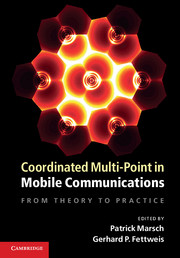Book contents
- Frontmatter
- Contents
- List of Contributors
- Acknowledgements
- List of Abbreviations
- Nomenclature and Notation
- Part I Motivation and Basics
- Part II Practical CoMP Schemes
- Part III Challenges Connected to CoMP
- 7 Clustering
- 8 Synchronization
- 9 Channel Knowledge
- 10 Efficient and Robust Algorithm Implementation
- 11 Scheduling, Signaling and Adaptive Usage of CoMP
- 12 Backhaul
- Part IV Performance Assessment
- Part V Outlook and Conclusions
- References
- Index
9 - Channel Knowledge
from Part III - Challenges Connected to CoMP
Published online by Cambridge University Press: 05 August 2012
- Frontmatter
- Contents
- List of Contributors
- Acknowledgements
- List of Abbreviations
- Nomenclature and Notation
- Part I Motivation and Basics
- Part II Practical CoMP Schemes
- Part III Challenges Connected to CoMP
- 7 Clustering
- 8 Synchronization
- 9 Channel Knowledge
- 10 Efficient and Robust Algorithm Implementation
- 11 Scheduling, Signaling and Adaptive Usage of CoMP
- 12 Backhaul
- Part IV Performance Assessment
- Part V Outlook and Conclusions
- References
- Index
Summary
In this chapter, we address the issue how channel knowledge - referring to both desired channels and the channels towards interferers - needed for various CoMP schemes can be made available where it is needed. We first investigate channel estimation techniques at the receiver side in Section 9.1, and then discuss how the obtained channel knowledge can be efficiently fed back to the transmitter side in Section 9.2, which is for example a crucial requirement for the downlink CoMP schemes investigated in Sections 6.3 and 6.4. The chapter shows that standard channel estimation and feedback concepts can principally be extended to enable CoMP in general. However, it also becomes apparent that large CoMP cooperation sizes may be considered questionable in practice, due to the fact that weak links cannot be estimated accurately, and the involved pilot and channel state information (CSI) feedback overhead may become prohibitive.
Channel Estimation for CoMP
One of the main challenges for CoMP schemes like joint transmission (JT) is to obtain accurate channel information in a multi-cell mobile radio environment with acceptable overhead for pilot signals.
The section is structured as follows. In Subsection 9.1.1, main characteristics of the mobile radio channel and state-of-the-art estimation and interpolation techniques like Wiener filtering will be introduced, with a special focus on channel prediction. For CoMP, the analysis then has to be extended to multiple channel components and multi-cell scenarios, which will be done in Subsections 9.1.2 and 9.1.3, respectively.
- Type
- Chapter
- Information
- Coordinated Multi-Point in Mobile CommunicationsFrom Theory to Practice, pp. 193 - 218Publisher: Cambridge University PressPrint publication year: 2011

